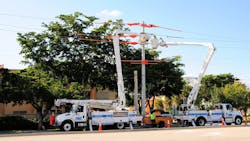Benefits of Adopting a Data-Driven Approach to Fleet Management
Utility professionals depend on their vehicles to transport them across wide geographical areas so they can conduct repairs, install new equipment, and maintain existing assets. When trying to restore power to an area, the last thing they want to worry about is a broken-down vehicle.
Vehicle downtime costs an average of $448 to $760 per vehicle per day. That makes it even more important for utilities to minimize these instances of downtime. This can be a challenging feat without a precise understanding of where vehicles are and how they are performing, or without a way to communicate in real-time with drivers. That’s where mobile devices and accompanying software solutions can help close the gap and give managers the visibility to conduct maintenance more proactively.
Field workers have always benefitted from mobile solutions — from laptops to tablets — so they can maintain consistent communication and look up important information as they travel to different jobs. However, mobile devices have become more useful to fleet managers as the software applications housed on them evolve.
Whether fleet managers are trying to keep vehicles running or coordinating repairs, they can use data-driven applications on their mobile devices to streamline the process. Let’s explore some of the benefits this data-driven approach to fleet management can offer.
Implementing a Data-driven Fleet Management Strategy
Let’s take a step back for a moment. Yes, fleet managers will need to prioritize deploying a comprehensive fleet management software solution that they can easily access on their mobile devices. However, before that can take place, they’ll need to carefully consider the types of mobile devices they implement given the harsh environments in which they operate. From working during extreme temperature swings to keeping teams connected across remote locations to supporting a seamless user experience even when gloves and raindrops interfere with the touchscreen, rugged mobile technology helps fleet managers always maintain access to critical data when and where they need it.
Maximize Efficiency and Minimize Downtime with Mobile, Data-Driven Workflows
Thanks to sensors in vehicles that communicate with software applications on their mobile devices, fleet managers gain much more visibility into the status and health of their equipment. These insights help minimize downtime so utilities can maintain productivity, while simultaneously reducing fuel consumption and vehicle idle times.
With better visibility into vehicle performance, fleet managers can more easily optimize assets. They can eliminate the need for unplanned downtime altogether by predicting an issue before it worsens and coordinating a repair at a time most optimal for the team.
Plus, with easy access to all this digital data, reporting becomes faster. One of the key priorities for utilities this year has been the adoption of more robust ESG reporting. A data-driven approach to fleet management will support this process, making it easier for utilities to collect and report more data that can ultimately help maximize fuel efficiency.
Monitor Vehicle Data
Greater visibility into fleet routes and the status of equipment can help keep operations cost-effective. Installing a simple, easy-to-use telematics system in vehicles can provide telemetry data on the vehicle location, engine diagnostics, and driver behavior. Once transmitted back to central headquarters, the fleet manager can monitor the data from each vehicle and efficiently address issues that require timely action.
This way, fleet managers can monitor the productivity and profitability of the entire fleet and uncover ways to reduce costs overall. For instance, speeding and rapid acceleration and braking can lower gas milage by 15% to 30% at highway speeds and 10% to 40% in stop-and-go traffic. Monitoring driver behavior like this can help fleet managers intervene to boost fuel efficiency and lower fuel costs overall.
In addition, data analytics platforms that provide insight into the status of equipment promote vehicle longevity by supporting predictive maintenance before issues result in larger, more costly repairs and replacements. Avoiding replacements saves the organization money in initial upfront costs. It also prevents them from having to train employees on a new vehicle and minimizes the complexity of maintaining a fleet of vehicles across various model years.
Take a Deep Dive into Vehicle Data
While time consuming, vehicle downtime can seem inevitable when overseeing a large fleet. That’s why it becomes critical to use a data-driven fleet management system to reduce the frequency of repairs and the length of downtime.
Fleet management systems that incorporate artificial intelligence (AI) and machine learning (ML) are beneficial because this technology dives deeply into data to uncover insights that would typically be missed by human review. Meanwhile, these platforms can analyze the state of the vehicle for better predictive maintenance. Now, if a vehicle is on the verge of breaking down, the repair team can proactively fix it because they already know what the problem is. Knowing what’s causing the problem streamlines the repair process tremendously, as repair teams arrive prepared with the tools and parts they need the first time around.
Furthermore, the insights compiled from these analytics platforms help fleet managers develop a detailed history of each vehicle that can be stored within the platform for easy access. This way, if a vehicle experiences a larger issue that can’t be repaired on the road, they can share this maintenance history with the dealer to help them uncover the problem.
Maximizing Productivity for Enhanced Customer Support
Once implemented, a data-driven approach to fleet management, powered by mobile technology, will minimize the time utilities spend on vehicle downtime and repairs. Instead, utility workers can focus their attention on servicing customers efficiently and working towards broader industry goals of modernizing the grid and expanding sustainability efforts.
Chad T. Hall is executive business development manager at Panasonic Connect.
About the Author
Chad Hall
Chad serves as Executive Business Development Manager at Panasonic Connect, overseeing the development of rugged mobile solutions to support the utilities sector. He obtained his bachelor’s degree in geography and master’s degree in geographic information science and cartography from Texas State University.
